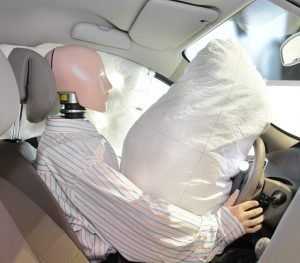
Free Consultation(203) 447-0000

Free Consultation(203) 447-0000
 Sixty million airbags have already been recalled for their defective and dangerous tendencies to cause serious injuries. Known as the “Takata Airbag Crisis,” this growing public safety hazard has brought to light one big question: Why aren’t airbags regulated? Takata’s own in-house failures have led to seriously lethal products being installed on millions of vehicles in the United States. A recent Bloomberg article highlighted these products and the deficiencies in our product manufacturing monitoring systems – showing just how easy it is for defective products to enter the market.
Sixty million airbags have already been recalled for their defective and dangerous tendencies to cause serious injuries. Known as the “Takata Airbag Crisis,” this growing public safety hazard has brought to light one big question: Why aren’t airbags regulated? Takata’s own in-house failures have led to seriously lethal products being installed on millions of vehicles in the United States. A recent Bloomberg article highlighted these products and the deficiencies in our product manufacturing monitoring systems – showing just how easy it is for defective products to enter the market.
The injuries and deaths that have occurred from this crisis are unbelievable. Victims have had severe facial lacerations and damages, and some have even been killed from debris that has shot out of their airbag and lodged into their brain, spinal cord, or even severed arteries. Multiple people have already died from accidents involving their defective airbags. While Takata has been slowly recalling vehicles with their defective airbags, these recalls often come too late for victims – with some victims receiving the recall notifications long after they have already suffered an injury. The original recall from Takata was in 2008 and was limited to only 4,000 Hondas that had them installed. Since then, the recall has been expanded by 20 times, most recently in May 2016. This is, by far, the largest and most complex recall in America’s history.
The recall now covers more than 60 million vehicles, including BMW, Ford, Honda, Tesla, Toyota, and 12 other models. The shrapnel found in these defective airbags has already killed 13 people (including 10 in the United States) and injured over 100.
The investigation that has been launched into the devastating errors of Takata airbags is grizzly. It has shown that executives of the company were pre-warned about the potential debris shooting from their defective airbags, and they chose to hid that potential danger from manufacturers of vehicles where their airbags were being installed. Takata stated that the behavior would never be repeated, but this confession does not help the victims who have already been injured or killed because of these easily fixable defects.
It has been estimated that it will take three more years for the company to fully replace the defective airbags.
But, where did the initial issue stem from? With Takata, it was about cost savings. The company looked toward another subsidiary to help create a cheaper propellant for their airbags that would do the job, but for a fraction of the cost. Because they were more concerned with cheaper propellants and less about safety, they were stuck with millions of defective airbags.
Unfortunately, federal investigations were opened in the end of 2009 – almost a year after the first recall. Then, the investigation was closed in less than six months and nothing was done. The manufacturing mistake was assumed to be nothing more than a mistake, and as long as the company corrected the issue, the federal regulators decided that there was nothing more to be done. If NHTSA had done the right thing and really looked into the company, they would have easily seen the documentation showing that Takata was aware of the risks and that there were millions of other drivers out there driving ticking time bombs.
You cannot rely on the government to track or even inspect these companies. Often, they rely too much on the documentation provided to them and do not probe deep enough to look for inconsistencies in their reporting. Had the federal investigators actually taken the time to review documentation or even speak with key personnel, they may have realized just how big the Takata errors were – and how they could potentially lead to more deaths.
If you have been injured, do not wait for a recall. Contact a product liability attorney right away. Whether it was a defective consumer product, airbag, or another item sold in the United States, you have rights under the law. To get started, contact Berkowitz and Hanna LLC today to schedule a no-obligation case evaluation. Call 866-479-7909 or contact us online.
Berkowitz Hanna
